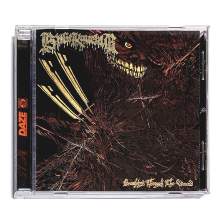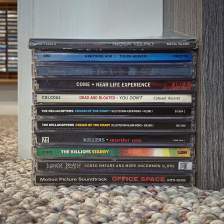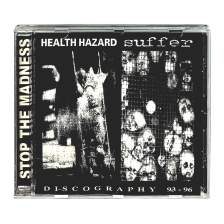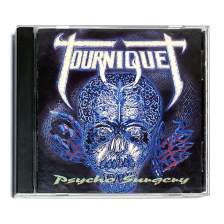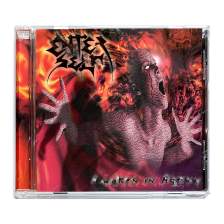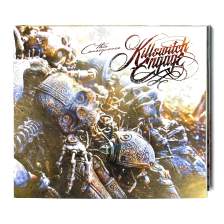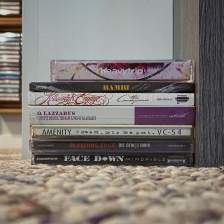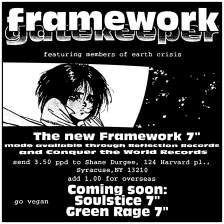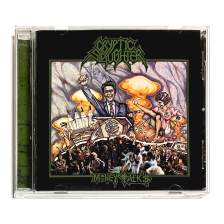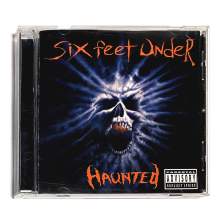Carl Skildum first landed on my radar via Threadbare's absolutely crushing EP, Feeling Older Faster, in 1996. Not long thereafter, his contributions to Krakatoa's Clouds Burned by Sunshine 7" completely blew me away, and I've been a huge fan of his guitar work ever since—following along with Picturesque, Seconds Before, The Good Fight, Antiverse, and beyond. This guy does it all, and it's been nearly 16 years since I last interviewed him, so it was high time to look back on his impressively diverse résumé, which only continues to grow...
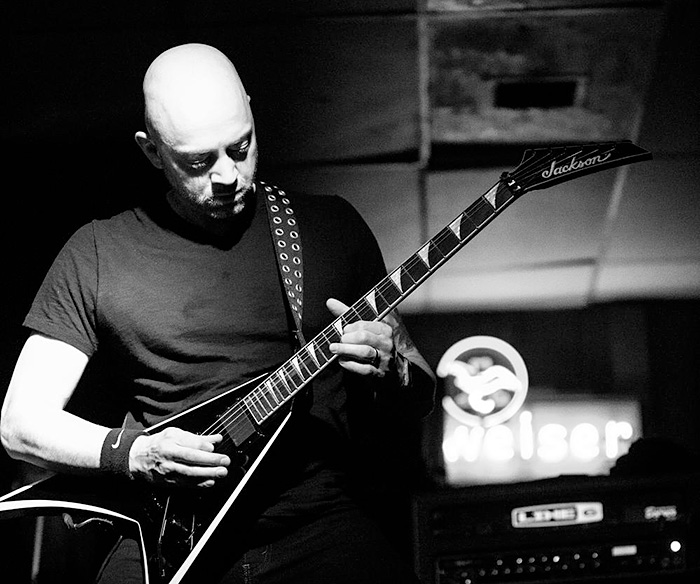
I don't ask this type of stuff often, but I've admired your guitar work for about 20 years now, so how old were you when you started playing, and what inspired you to pick up the instrument?
I started playing when I was 16. I was a fan of music all my life and had previously taken a crack at both violin and piano, but heavy metal and hard rock inspired me like nothing else, so it was natural for me to gravitate toward guitar.
What was your listening curve like in terms of eventually delving into hardcore and metal?
As a small-town kid in elementary and middle school in the '80s, I was fortunate to grow up in a magical time when heavy metal and hard rock was what all the other kids in school seemed to be excited about. Guitar-oriented music ruled the radio and MTV, and I had many guitar heroes before I even considered picking it up myself. I was also drawn into early hip-hop and punk from a lyrical bent—I felt like I was learning something about the world in a way that I couldn't necessarily get from mainstream hard rock. I moved to the city and got into skateboarding, and I first discovered underground speed metal and hardcore flipping through Thrasher magazine. That stuff definitely wasn't on the radio, so there were lots of blind cassette purchases by me and my friends based on reviews in zines and the insanity levels of the cover artwork.
You were in a band called Trial very early in the '90s, and if the internet is to be believed, you were actually the vocalist. Was that your first band? I'm assuming that was probably more of a traditional hardcore outfit?
Yes, that was my first real band in terms of playing shows. I did start out on vocals, because I couldn't sing and play at the same time. It was a standard '80s hardcore band, but we had lots of fun. I met so many people that have been important in my musical life around those first shows. There were great all-ages shows at First Avenue & 7th St. Entry on a regular basis, so the scene was pretty vibrant and diverse. We did one demo tape with me on vocals, but I also played guitar on the recording. That set me thinking that I'd rather do that.
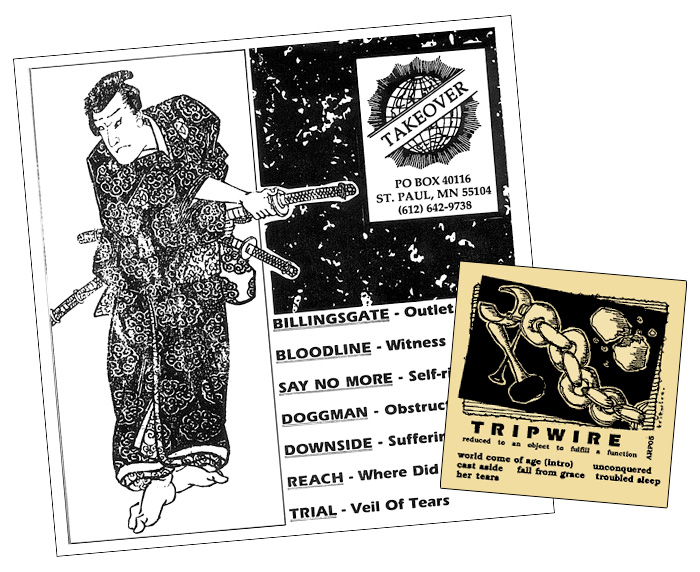
By 1992, it would appear that Trial had sort of turned into Tripwire—another band I've not heard—with you switching to guitar and bringing in a new vocalist. I know you recorded at least one demo, with the help of your future Threadbare bandmate Chad Dziewior...
That's exactly what happened. I decided I wanted to play guitar, and we asked our friend Luke Cragg to take over on vocals. We changed the name at the same time, but otherwise it was the same band. We recorded another demo tape and continued playing shows, but it was increasingly difficult as our other guitar player, Trent DeBoer, moved out of state for college. We parted ways simply due to the logistics of not being able to get together regularly.
What was that pocket of the Minnesota scene like in the early days? I was somewhat surprised to see so many familiar names popping up when I was doing research. The bands Downside and Reach alone featured among their ranks Jason Bauer (Engine/Krakatoa, Seconds Before, Antiverse), Chris Dales (Picturesque, Seconds Before), Chad Dziewior (Threadbare), Mike Paradise (Threadbare, Picturesque, Seconds Before, Antiverse), and Dustin Perry (Threadbare)—and Trial and Tripwire both featured your soon-to-be Krakatoa bandmate Chad DeBoer on drums, too. It must have been a tight-knit scene?
It was a really exciting time. The Entry was a major epicenter for the hardcore scene for a long time, and the all-ages shows there were legendary and inspiring. There were a lot of great D.I.Y. spaces for shows as well. The first time Trial played the Entry with Bloodline and Downside was a huge event for me—I met all these people who have remained important in my life to this day.
Also in 1992, Krakatoa originally formed under the name of Engine. What did that look like?
Chad [DeBoer] and I kept playing together after Trial/Tripwire ended. He lived in the same town where I was going to college, but he was still in high school. Jason Bauer and Dave Walker (Harvest) were in the first lineup, but Jason lived so far away that the long drives to practice became a dealbreaker for him. We found Roman Richardson at my college and went on to play a handful of shows around the Midwest.
We changed the name to Krakatoa thinking that would be a less common name, but of course there have been other bands before and after that have used that name. This was still predating web browsers, so you could get information about underground music from zines and rudimentary message boards, but you couldn't Google a band name to see if it had been taken.
I had no idea until just recently that Krakatoa actually recorded a demo, alleged to be in somewhat of a different style than the band would go on to develop years later. Of course, I have to beg for some details about this!
I just tried listening to that demo recently and couldn't get through it. There are hints of what we would eventually become, but—and I say this with utmost respect to Dave—the vocals weren't representative of what he did later. Dave hadn't yet developed the vocal style he became successful with on subsequent Harvest and Krakatoa recordings. Let's just say it exists.
The original "end" of Krakatoa crossed over with the start of Threadbare in 1993. From the beginning, it really seemed like Threadbare was something special and different—not just musically, but lyrically, aesthetically... everything. Sure, there were comparable acts out there, but few (if any) were able to combine an affecting sense of emotion with such a cohesive songwriting approach built around an oft-jarring and angular attack.
Mike, Chad, and Dustin had an early version of Threadbare with Brad Senne (Reach/Picturesque) on vocals in 1992 that I believe wound up being a few rehearsals and a couple of song ideas before they all got busy with other things. We met Brian Lovro when he was singing with a band called Switch and we were all floored by what he was doing. At that time, straight-up screamed vocals were rare, and we all felt like we'd never really heard anything like what he was doing. After Reach ended, Mike, Chad, and Dustin decided to make Threadbare their focus, and they asked Brian and I to join in.
We definitely had a vision for what we wanted to do, and a big part of it was to run against the grain of trends in hardcore—both in terms of sound and content. Brian wrote personal lyrics we could relate to on topics such as alienation and self-doubt, and that was a big part of the charge for all of us. We were all really invested in the band from the moment we all got in the same room for the first time.
Feeling Older Faster remains an unsung masterpiece of '90s metalcore. There's an artistry to it, and that EP was a real game-changer for me. It must be one of the heaviest releases in the Doghouse Records discography. Where was the band "fitting in" at that time? I never understood why Feeling Older Faster didn't make more of a mark on the metalcore landscape as a whole.
I felt like mostly people were politely interested in what we were doing when we played live, especially on the road. We played a lot of Midwest shows and an East Coast tour, and in general people seemed curious and occasionally enthusiastic. It was funny that when we first started playing out we were somewhat of an outlier in terms of sound and approach, but in later years we started hearing from other bands that they were inspired by what we did, which is really a nice feeling.
Escapist represented a slight shift. There were more definable post-hardcore textures, and in some ways it wasn't quite as dark (musically speaking). I didn't quite "get it" at first, but "Twenty One..." just completely destroyed me, and remains arguably my all-time favorite Threadbare track. How would you classify the way the band had developed by that point?
We had a tough time writing. There were a lot of songs abandoned on the way to making Escapist, and differing views on where we should go. Should we add more metal elements, or add more melody and cleaner guitar tones? Previously, we were able to write with all of us in a room together, but we found ourselves struggling to get around issues where someone wouldn't love a riff and the whole song would go in the trash as a result. Chad had already decided to leave the band, but I badgered him to stick with us to record Escapist. We all still really loved and respected one another, but there were definitely diverging interests in the type of music everyone wanted to play.
What brought Threadbare to an end? I can only imagine what a full-length may have offered...
We had always said that if one of us left, Threadbare would end. So, with Chad gone, we decided that it wasn't going to be Threadbare without him. It was just as much about the chemistry and friendship as it was about the music. We didn't bother auditioning anyone else. The last show we played was completely uneventful—we didn't know that was going to be the final show. The one really cool thing about that last show was that this band from New Zealand called Shihad was added to the bill last-minute. We were blown away by them, and they became a major influence on Mike and I with subsequent bands Picturesque and Seconds Before.
Threadbare reunited for a few shows in the '00s and '10s for special events, and they have been great experiences, but all of us are looking forward with new projects now.
Krakatoa's Clouds Burned by Sunshine 7" was released within the midst of the Threadbare days, and that EP blew my fuckin' mind and totally cemented me as a Carl Skildum superfan. With such a mixed bag of influences, it was so far ahead of its time. I can't believe it was written and recorded as a one-off in only two weeks!
That was a case of everyone having a couple summer weeks free and deciding to see how quickly we could make something cool happen. Krakatoa always wrote through jamming together, and those songs on the 7" have a lot of improvisation. There are just two main guitar tracks, right and left. I played them straight through, solos and all, and completely winged it on the solos. Dave's vocal style was fully locked in at this point, and we all felt really happy with how well it turned out in such a short amount of time.
A few years later, Krakatoa unexpectedly reunited and put together the equally astounding Channel Static Blackout full-length, and it sounded as if no time had passed. Did you know going in that this was another one-time thing?
I think we did know that we weren't likely to play shows in support of the full-length due to various school and work obligations. So, we wrote that record with the expectation that we could layer a bit more guitar in. We would have needed a second guitar player to make those songs work live without missing a lot of the harmonies.
To this day, I've never quite heard another band like Krakatoa: emotive but not "emo," barely "-core," and certainly more metal than most metalcore—but so uniquely melodic that it simply can't be viewed as "just" metal, etc. Your chord phrasings and everything were just so different, and the complexity of your riffs was sort of subdued because they were just so badass and catchy! If history was erased and Clouds Burned by Sunshine or Channel Static Blackout were released today, do you think listeners would be more receptive to what you guys had to offer?
There was always a groove element to that band that really came from the rhythm section being hugely influenced by hip-hop and funk. I always felt that the push and pull of my interest in metal and the other guys being more groove-oriented was a good challenge. There are elements of those records that seem rooted in that specific era for me, so it's tough to say how it would work today. I feel like extreme music has evolved in different directions.
In 1998, you continued to demonstrate your incredible diversity with Picturesque's four-song Shine in Eyes EP, released by Trustkill. This was your first foray into straight-up emo/indie rock. What was the story with that band? Was it intended to be a one-off project, or...?
Picturesque had a lot going for it that we just weren't able to take advantage of. We had four people who were experienced enough, still not tied down with family or work commitments, and we had a supportive label to work with—we were supposed to do three albums. We did the EP and a number of local shows, and we thought we'd maybe tour after an LP. We had completed demos for the first full-length, but ended up losing our vocalist Brad before we could record. We tried out a few other people but nothing stuck, so that was that.
Your longest-running band to date, Seconds Before, ran from 2000 - 2012: another emo/indie rock outfit—though slightly more polished—that amassed quite a healthy discography during its run. With Chris Dales (and eventually Mike Paradise) being involved, it makes me wonder if the band's roots kind of grew out of Picturesque at all?
Definitely. Chris and I lived in the same apartment building when Picturesque ended. I actually asked Chris if he would consider singing for Picturesque, but he declined. We sat and stewed for a few months until I got an email from Jason Bauer asking if I'd be interested in doing something. I grabbed Chris and his roommate Stan, and we started Seconds Before. Mike Paradise took over on drums in 2005. Some of the unused riffs from Picturesque went into Seconds Before. Of all of the projects I've done, Picturesque and Seconds Before were the most closely related.
As with all of your work, of course the tunes were killer, but what do you think it was about Seconds Before in particular that had that decade-plus staying power and prolificacy?
We were friends before anything else. There were several points where we could have (and maybe should have) thrown in the towel—including three vocalist switches—but we just kept at it because we liked hanging out once or twice a week. For many years there was a big audience for what we were doing, but that dropped off around 2010 as people got older and moved on to other interests. We did the final record in 2012 and felt super proud of it, and nothing happened with it. Creatively we went out on top, but it felt like we were an anachronism—like a barbershop quartet in the era of rock 'n' roll.
While Seconds Before had been going for a few years, you did another band with Dave Walker called The Good Fight—sort of a return to more of a traditional hardcore type of sound. A planned full-length was announced for Indecision Records, but the 2004 EP on Goodfellow Records was all that transpired. Why did that project fizzle out so soon?
I joined The Good Fight to be part of recordings and live shows, but that band was really the brainchild of the other guitarist, Kevin Call, along with Dave. Kevin ended up getting an offer to join Comeback Kid around the time that we were writing the full-length, and that was a great opportunity for him, so he took it. With their touring and recording schedule there wasn't much time left to focus on The Good Fight, so it faded out quietly. It was lots of fun to play with those guys, and I loved how fast the material was. Every song was a ripper!
One of the songs I wrote for The Good Fight LP that never was ended up going on the last Seconds Before album in slightly less intense form ("Where Dreams Go to Die"). It still has a D-beat in the chorus, though. Fun stuff.
In another impressive twist, within about a year of Seconds Before's end, three of the group's former members—yourself, bassist Jason Bauer, and drummer Mike Paradise—formed Antiverse with vocalist Rocky de Vries. More so than any of your prior output, Antiverse finds you showing off your true chops with some absolutely scorching, thrashing melodic death metal. How the hell did this monster follow on the heels of a borderline mainstream-friendly band like Seconds Before!?
A common theme from all my prior bands was that I played the music that matched the musicians I was with, but all along my heart was in metal. That's what I listen to on my own time. Mike was the same way: both of us had played in heavy bands while rabidly consuming all varieties of metal, yet we had never actually fully gone for it with a band that was just pure metal. This was the perfect opportunity to do it.
Antiverse is preparing to record its second album in the midst of Jason Bauer's severe battle with cancer. What can we expect from the new material, and—much more importantly—how is Jason feeling? Our thoughts are certainly with him, his family, and his friends.
Cancer is terrible. Jason has been through hell the last year. We are all struggling to come to grips with the news from his medical team that this is not a situation with a good long-term outcome. Right now, this summer, he is feeling pretty good. He's a few weeks done with his most recent round of chemo and is now in a clinical trial to hopefully slow the cancer down. He's able to enjoy a lot of his favorite activities right now, so we want to take advantage of the break between chemo, radiation, and surgery and show him as much fun as possible. So, we are going to push hard to get the new record done and are tracking drums now, and are trying to play out as much as we can.
We are really excited about the new material. It's not a rehash of what we did on Cosmic Horror, but it definitely starts from the same plane and ventures further into darker territory. We've added Matt Kirkwold on guitar and he has been writing some killer material—we've essentially split writing duties for this one, and I couldn't be happier with the result. So, working on this record is definitely a bright spot in an otherwise challenging situation.
On top of everything else, in 2015 you joined another Minneapolis metal band, Obsequiae, exploring more of an epic/atmospheric black metal style. How did that come about, and what's your role there?
I'm fond of beer, and I'm specifically fond of HammerHeart Brewing Company, which was co-founded by Austin Lunn of Panopticon. I had gotten to know [Obsequiae guitarist, bassist, and vocalist] Tanner Anderson from his work at the brewery, and we quickly bonded over our love for melodic death and black metal of the early-'90s. I was visiting the brewery one day and Tanner asked if I knew anyone who might be interested in helping him flesh out a live lineup for Obsequiae. I told him right there that I wanted to do it. And we're doing it! We've played some amazing shows—including the HammerHeart Ostarablot festival this spring—and are heading to Olympia, WA in a few weeks for Migration Fest. Tanner and I have such a common lexicon that these songs feel completely natural for me to play, and I'm having the time of my life. We have a few more shows lined up after Olympia, which should keep us busy through the end of the year. I'm in for as long as they'll have me.
Tanner and I are writing together, but it's going to be a different thing—just pure melodic death/black metal. It's going to be called Keld of Lethe. We have so much material written already, and are soon going to be at the point of culling things down to a full-length. If you are a fan of the No Fashion Records discography, this might be something you'll enjoy.
Alright, three more goofball fanboy questions, then I'll leave you alone! What with the relative ease and availability of modern recording technology, do you think there's any minute possibility that Krakatoa will ever regroup again? Even if only for another two-week, two-song EP? Anything!?
I never say never, but I have so much going on with Antiverse, Obsequiae, and now Keld of Lethe that I feel like I'm really able to cover all the bases I need to for now.
Having covered so much ground in your musical career, I'm curious where else your listening habits extend. So, in typical fashion, I have to ask: what other styles of music do you frequently enjoy listening to that you've yet to explore in your own work?
I've liked electronic music and synths since I was a little kid, starting with the first cassette I ever purchased: Devo's Freedom of Choice. It's a bit of a cliché for a metalhead to like the current synthwave scene of '80s throwback/John Carpenter-influenced electronic music, but as someone who grew up watching classic sci-fi and horror movies scored with spooky synths, it's in my DNA. I do dabble a little bit with my keyboard at home. Jason and I have been composing little synth segues to provide atmosphere between songs for Antiverse shows, so that's been fun.
And, finally, who might you cite as the five guitar players who most shaped your own approach to the instrument?
There are definitely individual guitar players that inspire me, but when I sat back to think about this, I realized that so much of what influenced my playing comes from duos. I love the interplay between two guitarists, especially where roles like lead and rhythm are interchangeable and shared. I tried to replicate that feeling by myself on Channel Static Blackout and Cosmic Horror, and it worked out okay, but it's even more rewarding to be on the same page with another guitarist. So, I'll go ahead and say that [Slayer's] King/Hanneman, [Mercyful Fate's] Denner/Shermann, Di Mieola/McLaughlin/de Lucía (okay, that's a trio), [Fates Warning's] Matheos/Aresti, and [Iron Maiden's] Smith/Murray probably have a lot to do with the foundations of my interests on guitar and how I approach writing today. I'm very lucky to be playing with Tanner Anderson in Obsequiae and Matt Kirkwold in Antiverse, they both challenge and inspire me immeasurably.
***
Keep up with Antiverse on Facebook, and stream or purchase Cosmic Horror through Bandcamp. Obsequiae can also be found on Facebook, and their latest album, Aria of Vernal Tombs, is available via 20 Buck Spin.

